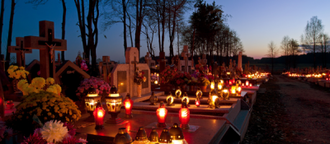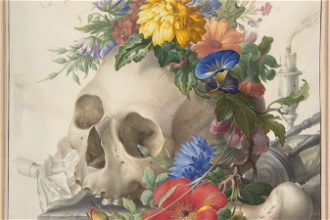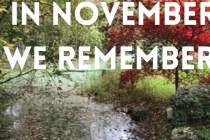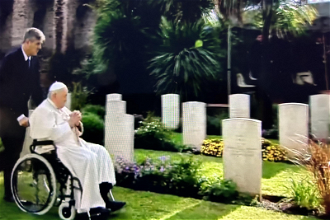From Halloween to All Souls' Day: A reflection on our spiritual state

Image: Jesuit Institute South Africa
Source: Jesuit Institute South Africa
Sarah-Leah Pimentel from the South African Jesuit institute writes:
I don't remember Halloween parties as a child. It wasn't a thing in 1980s South Africa. More recent influences from US-based movies and culture have brought this once pagan, later Catholic, but now commercial celebration to our shores. There is a tension between those who enjoy the opportunity to dress up in ghoulish garb and those who feel that it's an assault on Christian values. Perhaps I can offer a different perspective on Halloween.
The ancient Gaelic festival of Samhain, celebrated in Britain and Ireland, marked the end of the harvest and the beginning of winter. The Celts believed that on this night, the boundary between the human and spirit world was thin. This enabled the souls who had died to visit their earthly homes before going onto the otherworld. People lit bonfires to ward off evil spirits and wore masks to prevent ghosts from recognising them.
As Christianity spread throughout the medieval world, the Church imbued pagan feast days with new meaning. Samhain became All Hallow's Eve ("hallow" means "holy") and was celebrated as a vigil before All Saints Day on 1 November. Instead of warding off evil spirits, the fires (in the guise of jack o'lanterns) came to symbolise our prayers for the souls in purgatory to find their way to heaven.
The modern Church has two back-to-back celebrations. On 1 November, we remember the saints - those who lived exemplary lives and showed us the road to heaven by inspiring us to love God and neighbour as the Gospel encourages us. 2 November is All Souls, where we visit the graves of our loved ones and pray for all who have died. Catholic tradition tells us that the dead can do nothing further for their salvation but can only await God's mercy. However, we, the living, can help them with our prayers to ready them for eternal life.
Looking at these three celebrations, I can see a transition, which is, at its heart, the movement of the human spirit towards God.
Old Hallows Eve focuses on our present-day reality. In the pagan tradition, evil spirits sought the ruin of souls, but evil is not just a supernatural phenomenon. It is the reality of our temporal human woundedness. The conflicts in Israel/Palestine, Russia/Ukraine, Syria, Ethiopia, Myanmar, and countless places globally. The rampant rape of the earth's natural resources in the Amazon and Congo Basins. Economic exclusion in some of the world's most unequal societies, including South Africa. We are doing this. We are the evil spirits when we appeal to the baser part of our nature.
Then comes All Saints Day. It calls to our higher nature that has a share in the divinity of God. We are reminded that we are created in God's likeness. He created us in love, for love. His will for us is to live in harmony with him, one another and all creation. The saints did this, and they encourage us to do likewise. We are reminded that a better world is not utopic: it's possible if we act for good.
All Souls Day prompts us to recognise that our lives are a measure of the good and the evil that we do. We strive for higher goals, but the sufferings and disillusions of life often lead us to make poor choices. Other times, we hear that higher calling and cooperate with God to create a better world. When we die, Scripture tells us we will stand in judgment before God. It is not God who condemns us. Instead, our shame for the times we missed God's plan makes us turn away from his mercy and forgiveness. It is precisely during this state that we need the prayers of those left behind to help us enter into the embrace of Eternal Love.
In conclusion, Halloween is much more than relishing fantasies of ghosts and haunted houses. It is an invitation to a sober reflection on the state of our world and our lives. It urges us to renew ourselves in a harmonious relationship with Divine Love and our neighbour.
Follow The Jesuit Institute on Twitter @JesuitInstitute


















